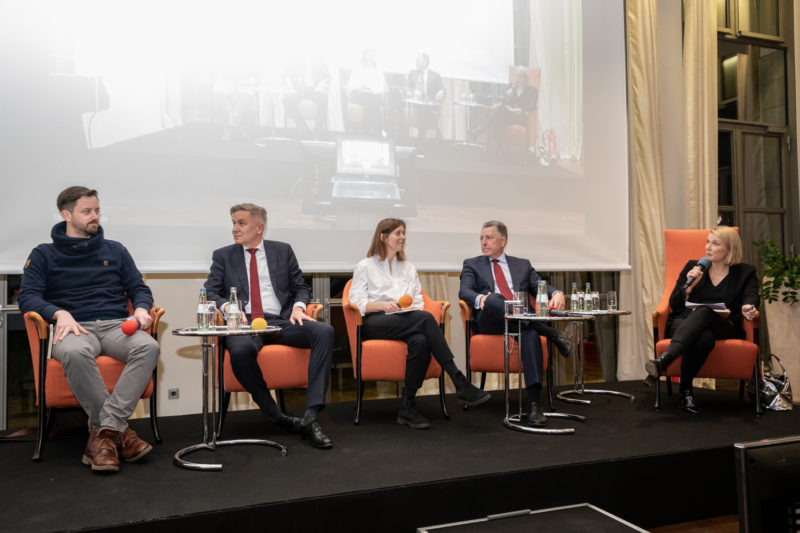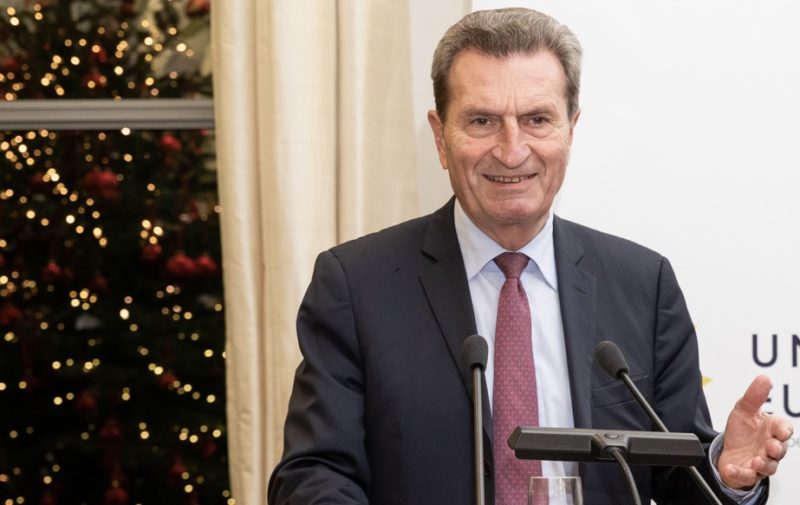
On 5 December, our panel discussion on transatlantic relations took place after the United Europe Assembly. The event was moderated by Cathryn Clüver Ashbrook, a German-American political scientist, consultant, journalist and Executive Vice President/Senior Advisor at the Bertelsmann Foundation. After the opening speech by Günther H. Oettinger, experts discussed a new geopolitical order and Germany’s role in taking the lead to restore ‘European Power’.
Dr Josef Braml is one of Germany’s most well-known transatlantic experts and has just published a book called ‘Transatlantic Illusions: The New World Order and How We Can Retain Our Role in It.’ He is also the General Secretary of the German Trilateral Commission.
Mattia Nellis has filled in our panel this evening for Ludmyla Melnyk. He heads the office of Robin Wagner, a German MdB of the Alliance 90/Green Party. Mattia is also the co-creator of an independent public affairs office that looks at German Ukrainian relations.
Iryna Stavchuk is the Ukraine manager at the European Climate Foundation and the former deputy minister of the environment in Ukraine.
Kurt Volker is the former US ambassador to the North Atlantic Treaty Organization and Special Envoy on Ukraine until 2019. Kurt has a distinguished diplomatic career serving both Democratic and Republican presidents, but of course, was also the founding executive director of the McCain Institute.
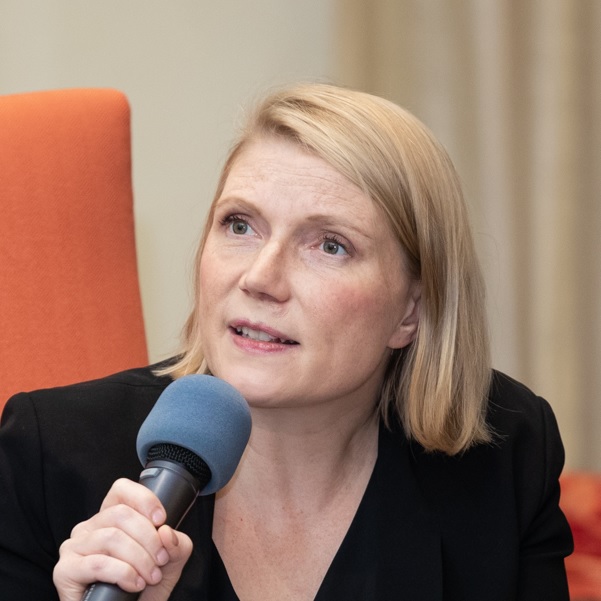
Cathryn Clüver Ashbrook: We’ve just witnessed a state visit of a French president to the United States who made a couple of interesting pronouncements on how he envisions European order in the future. And the German chancellor just published a piece in Foreign Affairs, where he also extends this idea of the Russian role in the European order. Kurt, is it the right time to think about the future of European order yet, when the battlefield in Ukraine is what it is?
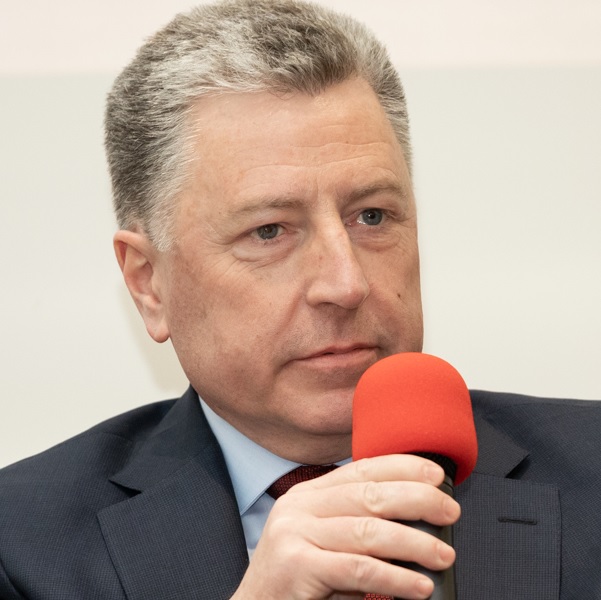
Kurt Volker: I want to take your question into a broader context. Vladimir Putin is antithetical to the idea of the European order. Vladimir Putin has a fascist and imperial policy of denying the right of Ukraine to exist as a country, denying the existence of Ukrainians as a people and national identity. He has called them confused Russians. He has compared himself in public more than once to the Great Tsars, Peter the Great or Catherine the Great, ha. Whether it is the authoritarianism at home, the denial of human rights, the cynical and barbarous attacks on civilians, or the war crimes committed in some of the most heinous ways, there is nothing consistent with the idea of freedom, democracy, peace or security in Europe, period. Instead of talking about security guarantees for Russia, we should be demanding from Russia security guarantees for Europe, because Putin is the one who is violating all of the rules, norms and standards.
Josef Braml: It is not in our hands to determine whether there should be a diplomatic solution or not. It’s America. Ukraine wouldn’t be there, despite all the bravery we have seen, without American help. And if America decides there is more important business in Asia – look at Taiwan and China, then Europe has to take care of the wild bear. We have to take care of our own responsibility. We have to think about deterrence. We have to think about nuclear deterrence, even without America.
Cathryn Clüver Ashbrook: Mattia, what’s your read on the current situation, both the close focus on Ukraine and the immediate surround as it relates to the big powers?
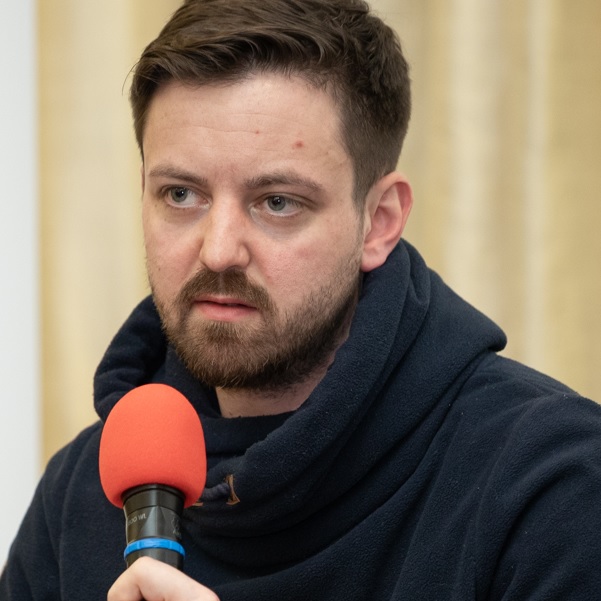
Mattia Nelles: I wouldn’t underestimate the Ukrainian ability to influence our decision-making. I wouldn’t say Ukraine is powerless Ukraine should have the major say in this and they will ultimately decide for how long they are willing and able to fight.
Regarding the European order, there is already a shift taking place, which is interesting from a German perspective, a shift away from a Franco-German-dominated EU towards the more northern and central Eastern European centre of gravity. Looking at the future European order, I think the Scandinavian and the Baltic Eastern Europeans will have a much larger stake.
Macron‘s point of view is that Russia has to be brought in from the cold and „we shouldn’t humiliate them“. For Ukrainians this is enraging, to speak about security guarantees for Russia at a point when Ukraine is fighting for its survival is difficult to bear.
We are already thinking about a new European security order where Russia will eventually democratize and will be part of Europe again. But how do we get there? First Russia must be defeated in Ukraine and there must be a negotiated outcome.
Before we haven’t figured out the first part, the discussion about the second part is theoretical. Of course, Russia will play a role but there can’t be guarantees. First and foremost, these guarantees have to be for Ukraine.
Cathryn Clüver Ashbrook: Kurt, we heard at our gathering at Globesec’s conference very clearly that this war ends when, „Ukraine has won“ and territories are liberated, including Crimea. What is your take here?
Kurt Volker: If the Biden administration were to be seen publicly pushing Ukraine into negotiations to give up territory in exchange for Russia promising to stop killing, they would come under intense domestic criticism in the United States from leaks from the Pentagon, from members of Congress, Republicans and Democrats. There is tremendous unanimity in the mainstream political class, Republican, Democrat, House and Senate professionals in the administration in support of Ukraine and pushback on Russia. The future of Europe is being decided on the front lines of Ukraine. How Europe comes out in terms of an identity of a European Union that is open, inclusive, prospering, that sees Ukraine as an asset, bringing resources, bringing talent, bringing economic growth, bringing energy to Europe. And on the other hand, a Europe where Ukraine is defeated, where Putin is still around and Europe is having to guard itself against further imperialist and fascist attacks against the idea of Europe. That’s a very different Europe. The future of Europe is really being decided through this war.
And then the final point, China is watching. China is not supporting Russia. They’re not giving them military equipment. They’re not evading the sanctions. But they are also watching how Ukraine performs and how the West performs. They would love to see the West disunited. They would love to see a failure. They would love to see Ukraine weak and Putin prevail in a way that would tell them that their efforts to turn around or upend the global political and economic order can be successful. If they see Ukraine winning, Russia weakening itself and the West strengthening and united as a result, that tells them that upending the global political and economic order is not going to be easy.

Cathryn Clüver Ashbrook: So given that you work within the heart of Parliament and given that you’ve been so engaged in this, how do you see these sort of layer cakes of European debates playing out?
Mattia Nelles: The commission is not the problem. The European institutions are actually leading the response to this Russian war. Especially von der Leyen, is leading ahead without having a majority on the membership question of Ukraine. She went ahead and embraced it before there was even a majority in the Council or among the Member States as a whole. So I would say the Commission is exemplary from Ukraine’s perspective and we have a problem of consensus within the Member States, and this is where we get to Germany. Germany’s response has been exemplary to an extent, Germany’s military assistance is better than its reputation. And the European Sky Shield Initiative is another example where the EU is trying to respond to this new reality. And on the downside the last point is about the 100 billion under the special fund that Germany adopted, 0.00 Euro have been spent. Germany has not arrived at this new reality. We are still in a mindset of peace.
Cathryn Clüver Ashbrook: The main wedge that drove straight through the heart of Europe was the question around oil and then the questions around gas and the fact that it took so long to figure out what the floor price of gas would be. Europe is having a hard time holding itself together on these issues for some of the macro questions that were just raised. What is your take on the European cohesion component and also on Germany‘s „leadership“?
Josef Braml: In the German military we had a saying: ‚we hold the ground until the real military shows up, meaning our American friends. Germany didn’t do a good service to its military in the last three decades. I mean, Germany doesn’t have a military, let’s be honest. America does what it does to show strength to Asian allies. They help Ukraine also in part to signal to South Korea, to Japan, we will be there for you if the Dragon gets wild. America is focused on Asia.
But if you push the sanctions against Russia too hard, you may not have regime change in Moscow, but regime change in Washington – if oil prices spike up. America cannot be too harsh on all sanctions against Russia otherwise, they make a good preparation for Trump to come back to the White House. Our American economist, Janet Yellen, told us, don’t be too harsh on the sanctions because that would push inflation much more. So people are already predicting not only an economic crisis but also a financial crisis in the next year. And if that happens, we won’t talk much about Ukraine, believe me.
Cathryn Clüver Ashbrook: There has been some remarkable unity by the Europeans on the humanitarian and financial aid and thinking about what the coffers need to look like to rebuild Ukraine going forward. We’ve already had our first series of donor conferences. If you look at this from your specific perspective, is the current needs assessment for Ukraine lining and matching up?
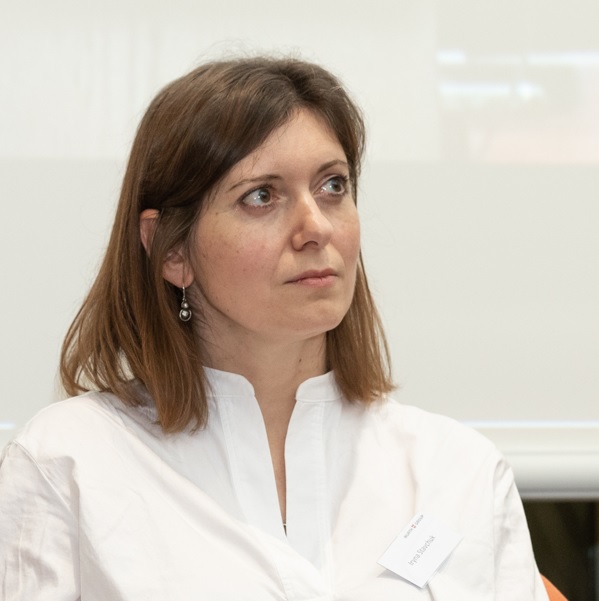
Iryna Stavchuk: Before recovery, it is time to answer difficult questions, for example on the leadership, coordination, and finance of local institutions to implement projects in Ukraine and how the funds will operate. Ukrainian society expects transparency. We know how corrupt things can be in Ukraine. Ukrainians expect the international community to help Ukraine control and keep things transparent whilst rebuilding institutions based on good governance principles. For me, a person who used to work in government on climate policy issues, a green and climate-smart recovery are key issues.
Cathryn Clüver Ashbrook: Kurt, you observed Ukraine for a long time. Its development toward Euromaidan and forward. When you hear Iryna’s assessment on the rebuilding piece and think about what the domestic climate could be going forward, what’s your assessment?
Kurt Volker: I went to the Lugano conference. I went to the Berlin Conference. I’ve seen all of these discussions about Ukraine‘s economic recovery, and I can assure you that absolutely nothing is happening. And this is a problem. There is no plan. There is no action. There is nobody in charge. There is no Ukraine recovery coordinator in Washington, in the EU or in Berlin or in Paris or London, at the IMF, or at the World Bank. There is zero. So this is a problem. We need to get organized and think about how to do this. But Ukraine cannot afford to wait until after the war. We need to get the economy going.
Cathryn Clüver Ashbrook: Kurt talked about the donor conferences and how you incentivize private investments. What’s your read of this landscape?
Mattia Nelles: I’ve been also at these donor conferences. I would slightly disagree. Von der Leyen is leading ahead by saying we need to adopt macro-financial assistance worth 18 billion for the next year to get Ukraine kind of through the next year because the budget deficit is sky high and without even the pledged aid arriving, the inflation is skyrocketing. We have to focus on Ukraine’s immediate survival, which is not guaranteed economically and militarily. And that’s why grants are very important because Ukraine’s debt ratio to GDP is around 100% now. Ukraine is now already spending 50% of its budget on defense spending, we have to be laser sharp, focused on getting Ukraine through 2023 first and plan for the recovery afterward. And if you take the longer-term needs, we’re looking at $750 billion, what it would cost to rebuild Ukraine. We have to keep the Ukraine economy afloat while we ensure that these rockets are not flying anymore.
Cathryn Clüver Ashbrook: Robert Habeck‘s ministry has just published its own „China strategy“. Look ahead and you may envisage a potential military incursion on Taiwan potentially by 2027. In terms of European responsibility and European power both vis a vis Russia and China, what does that do to European cohesion, European economies, and the model of the European economy that is the foundation of, if it so exists, European power?
Mattia Nelles: Germany is learning lessons from Russia’s war of aggression. And let’s face it, Germany was too dependent on Russian energy. The idea was that rapprochement through trade would work. And the reality is, no, actually it worked the other way. We are more of the autocratic states, they had more influence on us than we on them, I would argue. So with China, it is very difficult because businesses will tell you it’s difficult to decouple. We must make ourselves aware of dependencies and make them interdependencies or diversify away from them. If we just blindly follow the status quo, we’re going to fail.
Cathryn Clüver Ashbrook: How much is happening in the European strategy to achieve something like European power? You’ve just mapped out, the ideal of what a German taxpayer, a European taxpayer certainly, would wish is going on in the halls of government. Planning for all contingencies, figuring out how to refinance European power for the future, and foresight on all these potential scenarios. What’s your wish list?
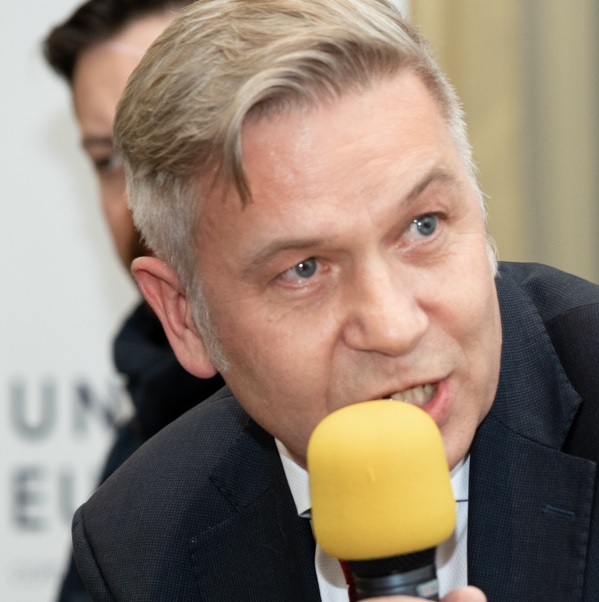
Josef Braml: We can learn from the US and just print more money. It is called quantitative easing. The US-states are not always on the same page as Washington, but if they take money from Washington with rules and also incentives attached to it: The „golden strings“. If we issue common debt and give money to individual states such as Poland and Hungary we can say: if you take that money, there are rules to comply with. And that’s what we can learn from the United States of America. That’s what America did after the economic crisis, the First World War and the Second World War. And that’s what we have to do in Europe. Issue common debt. Then we are talking about the superpower Europe.
Cathryn Clüver Ashbrook: Iryna, Europe has committed to undergoing also a green and energy transition that will then have to lead the transition in Ukraine. As you think about European power in the way that you conceptualize it, what is it and how is it going to help us move these big questions of transformation forward?
Iryna Stavchuk: We must resolve the climate change issue. We have to implement all those measures that we are thinking about in terms of the transformation, of economies, different sectors and industries. It makes all economic sense, the energy efficiency and moving towards renewables. The question is how to make things happen, how to put all the barriers of it and how to make things run. There are a lot of opportunities in Ukraine in terms of critical raw materials, in terms of hydrogen, in terms of renewables.
Cathryn Clüver Ashbrook European societies will have to go through a degree of transformation. How will the transformations manifest themselves in our public sphere? Where will the European and German dance model go in the future with the loss and change that caused a manifest at the heart of our democracies and the attraction of populism?
Kurt Volker: Ukraine for Europe is an asset, not a liability. Ukraine will bring the fastest economic growth on the continent for the next five years after 23 is over. So 24 onward, it has energy resources, renewable energy resources, it has minerals, it has mining, it has rare earth minerals, it has an incredibly talented population. It has one of the best tech sectors in any European country. It is a sophisticated country and an asset for Europe. And Europe will be far stronger and better with Ukraine.
You can find the recording of the panel discussion on our YouTube Channel.
We thank our panellists for their committed participation and our corporate member Würth for their friendly and professional cooperation.



